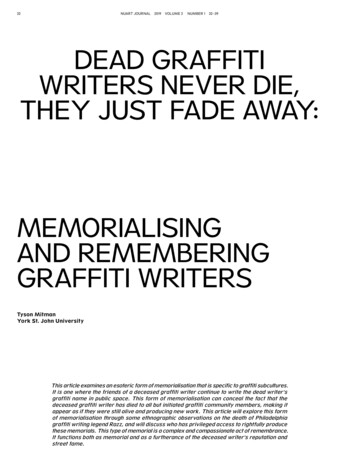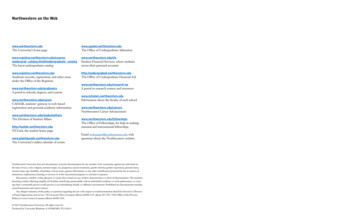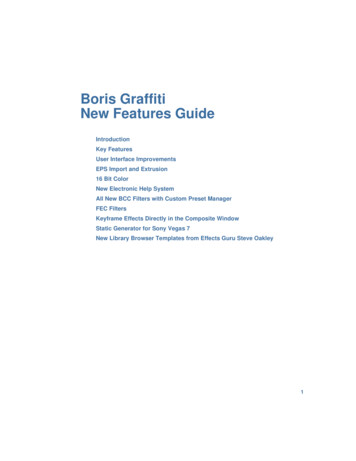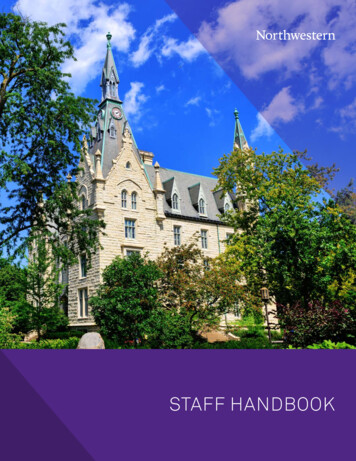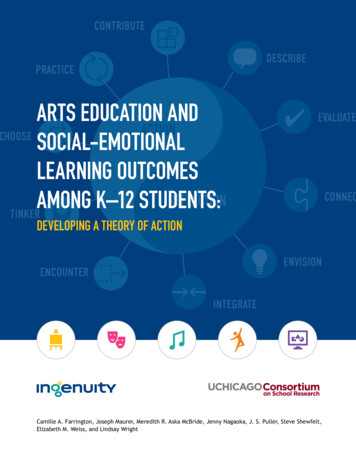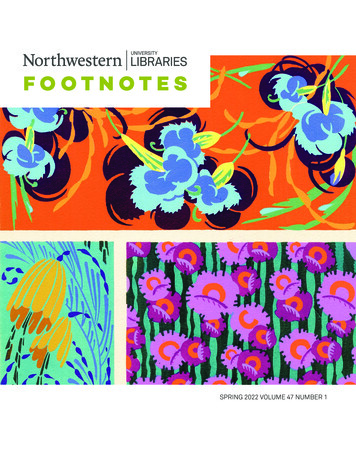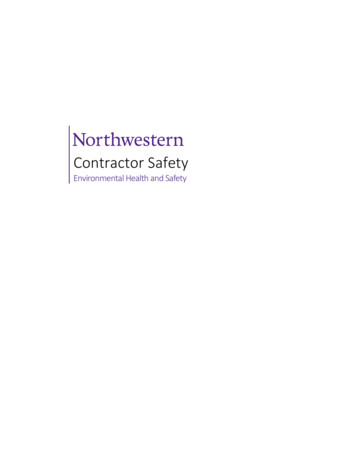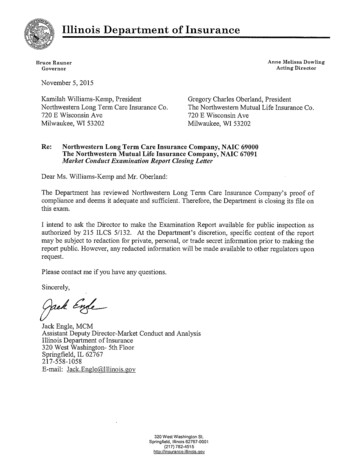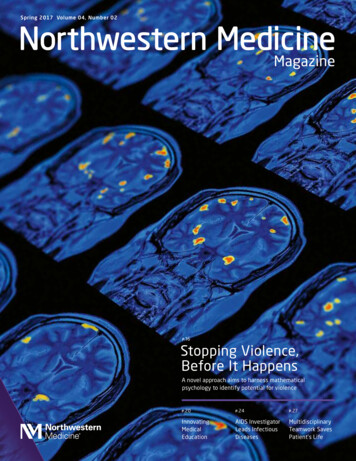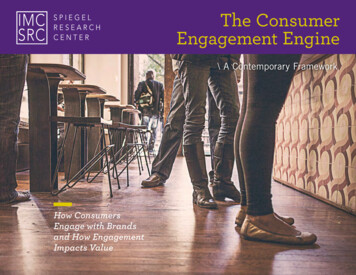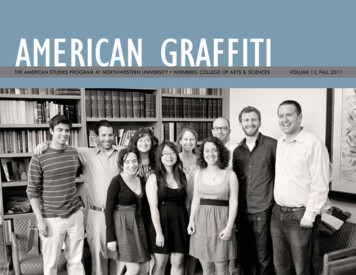
Transcription
AMERICAN GRAFFITITHE AMERICAN STUDIES PROGRAM AT NORTHWESTERN UNIVERSITY WEINBERG COLLEGE OF ARTS & SCIENCESVOLUME 12, FALL 2011
A MESSAGE FROM THE DIRECTORBY KATE BALDWINThere is a lot to celebrate in American Studies at theend of the academic 2010-11 year. Not only has itbeen a year of enormous changes for our curriculum,but we’ve seen our students stretch themselves andexcel, many of them awarded with prestigious prizesand fellowships to honor their accomplishments. Wealso were proud to host a series of popular speakerevents, starting off in the fall with NYU scholarMoustafa Bayoumi, continuing with a symposiumto mark the Mark Twain anniversary, and cappingoff with the co-sponsorship of an internationalconference titled, “Globalizing American Studies.”Bayoumi’s talk, “How Does it Feel to be a Problem?Being and Young and Arab in the U.S.” drewa diverse crowd from Chicago, Evanston, andthe Northwestern community. The Mark Twainsymposium, Twain in the 21st Century, featuredsenior scholars Jonathan Arac of Columbia andSusan Gillman of UCSC, and marked the occasionof the publication of Twain’s autobiography. Wealso hosted two scholars from University of Indiana,Bloomington, Ned O’Gorman and Kevin Hamilton,who co-wrote and presented a talk titled, “Weare All Operators Now: Gender at the Cold WarNuclear Console;” and in the winter our studentswere delighted to hear local media expert and NotreDame professor Jim Collins’s talk, “Coming Soonto a Screen Near You: Literary Experiences acrossDigital Cultures.” “Globalizing American Studies,”co-sponsored with the Center for Global Culture andCommunication, took the campus by storm. Therewas standing room only to hear scholars from a rangeof countries including India, Ireland, Italy, and Egypttalk about the impact, imagination, and resistance2to Americanization around the globe. Later in thespring, we welcomed Assistant Professor John Low(Ph.D. University of Michigan), who spoke to usabout local Potowatomi culture and history. We arevery pleased that Professor Low will be joining usfrom the University of Illinois at Bloomington, wherehe has been on fellowship, and that he will be teachingAmerican Indian Studies in the Program next year.Throughout the year our students worked hard in andout of the classroom. As a Program we sponsored andserved two sack lunches at the First CongregationalChurch of Evanston, part of Inter-faith Action’s soupkitchen program in Evanston. Several of our studentswere engaged with the Living Wage Campaign; othersled committees on the Dean’s Student AdvisoryBoard and the Center for Civic Engagement (SEED);and some continued their scholarship from abroad.I will never cease to be amazed by the students’commitment to building a community of scholars;and by the various ways they are able to bring thissense of commitment and social alliance to thecommunities around them, including those atNorthwestern and the cities surrounding us. Ithas been a pleasure to work with these studentsover the last three years, to witness their numerousaccomplishments and to see their scholarly andleadership potentials build and flourish as majors.Every year, it is difficult to say goodbye to our cropof seniors, who spend the year devoted to writingtheir senior essays and in so doing build strongbonds of senior camaraderie within the major.As always the sadness of saying goodbye alsodovetails with the pleasure of welcoming our newmajors, ten this year, a fantastic group of enteringsophomores and juniors who will be the first toexperience the guidelines of the new curriculum.In March the Program Committee’s proposal fornew requirements for the major was approved,and we have a new curriculum that engages withother programs on campus connected to AmericanStudies, including African American Studies,Latino/a Studies, and Asian American Studies. (Formore details about these changes, please see thesection “What’s New in American Studies.”) With acomparativist and globally-oriented curriculum, notonly will American Studies continue to be a vital hubof intellectual activity for our students, it will be aleader in the interdisciplinary program building ofWeinberg College. As we implement a new AmericanStudies for a new decade and a new century, we areexcited about remaining one of Weinberg’s flagshipprograms. Please join me in congratulating all thosewho worked hard to make the new American Studiesa reality, including Professors Carl Smith and JayGrossman; Program Assistant Natasha Dennison;and our majors, whose many talents and rangesof expertise are detailed in the following articles.Here’s to a thriving future of Americanist scholarshipat Northwestern!L-R: Professor Carl Smith, Program Director Kate Baldwin, andProfessor Jay Grossman.
WHY DO STUDENTS JOIN AMERICAN STUDIES?JONATHAN CLOW, WCAS 2012The American Studies program offers the chanceto study and learn with some of the most driven,intellectual students and faculty on campus. Thisdiverse community of scholars appealed to me. Toparticipate in an academic culture focused on thisconcept of America, from multiple perspectives,with various methodologies, is an opportunityunlike any other on campus.SAMANTHA OFFSAY, WCAS 2013I am interested in the interdisciplinaryapproach of American Studies; I believethat every class has the ability to add to one’sunderstanding of another subject and amgrateful to have a major that affords me theopportunity to better understand all aspects ofAmerican culture.HYUNGJOO HAN, WCAS 2013I first found out about American Studies froma current major who recommended the program.As I began to find out more information aboutAmerican Studies, I was very attracted to itssmall size, the seminar series for majors, and itsemphasis on conducting independent research. Iknew I would benefit greatly from the small classsize because it would provide an opportunity forme to interact and get to know the other majors as well as the professors. My experiencethus far has been very rewarding - intellectually stimulating and challenging at the sametime - and it is exciting to work and learn with other program majors whose knowledgeenrich class discussions.I found the American Studies programappealing because of the outstandingteaching and the ability to take seminarswith the same group of students, allowingfor scintillating academic conversations bothinside and outside the classroom. AmericanStudies has provided an opportunityto extend my love of history to a place where I can take a more active role inthe classroom than in the lecture hall and truly exercise critical thinking skills.The program has also provided some of my closest friends on campus, as well asclarity of purpose in what I want to study during my years at Northwestern. MyAmerican Studies concentration is the “Economics of Education,” and I havetaken courses from a variety of departments for the major, including sociology,humanities, and statistics.CHRIS BOHL, WCAS 2013HAYLEY ALTABEF, WCAS 2012I am a Weinberg Junior, and I became an American Studies major because Iwanted to take an integrated approach to my liberal arts education. The AmericanStudies program has allowed me to investigate my interest in race and immigrationthrough the lenses of English, History, and African American Studies.CHRISTINA POWERS, WCAS 2012I was originally interested in AmericanStudies for the flexibility of the program;the ability to take courses across a multitudeof disciplines has been a formative elementof my undergraduate education. It is onlyafter having been in the seminar sequencethis year that I’ve come to truly experiencethe interdisciplinary nature of AmericanStudies through the seminar topics, my professors, and of course, my peers.The program, both in and outside of the classroom, is challenging, yetengaging - and probably one of the strongest sources of academic communityat Northwestern.3
WHAT’S NEW IN AMERICAN STUDIES?double major, especially if they are interested inethnic American studies and would like to be involvedin an honors curriculum to pursue their interests.Since its inception in 1974 the NorthwesternAmerican Studies Program has successfully drawnupon the expertise of Americanist faculty andthe intellectual curiosity of its students to be oneof the most successful interdisciplinary majorsin Weinberg College. The small seminar setting,flexible curriculum designed by each student, closeworking relationship between students and faculty,strong focus on writing, and year-long seniorresearch project are all elements of the Programthat have contributed to its continued success.Likewise, these changes help to formalizecollaboration with other Americanist programsand departments that are on campus (AfricanAmerican Studies, Asian American Studies, GenderStudies, Latina/o Studies) and centers (Centerfor Forced Migration Studies, the Buffet Center,Center for Global Culture and Communication).These programs and centers have emerged as afocus on interdisciplinary scholarship has becomethe rule rather than the exception; and they haveemerged in an effort to address faculty and studentinterests in pursuing interdisciplinarity in depth.BY KATE BALDWINGrowing on this success, in 2011 the Programunderwent a major curriculum revision in orderto respond to the evolution of American Studiesas a discipline over the last few decades. Our newcurriculum offers a course of study that reflectsthe intellectual project of American Studies as notonly interdisciplinary but also intercultural andcomparativist at root. We encourage study of thedevelopment and expressions of national culturealongside borderland and diasporic Americancultures, and how they have changed over time.American Studies continues to offer its studentssmall seminars and a close research relationshipwith a faculty adviser in the senior year. Atthe same time American Studies now providesstudents with the advantages of investigatingfrom several perspectives the diverse experiencesof Americans locally, nationally, and globally.Our move towards a more inclusive American Studiesmakes prominent and essential inter-ethnic, racial,and socio-economic concerns. Each student mustdeclare an area of concentration that is comparativeor global in focus. We also encourage students to4Moreover, with the new formation of AmericanStudies, we aim to diversify the student bodyof the Program, appealing to a wider range ofstudents who might seek out American Studiesas the place where they can do a project onAsian and Latino literature; or a project on interethnic conflict in the transatlantic trade market.Finally, we are interested in actively helping AmericanStudies majors become productive members of anincreasingly diverse and globalized U.S. Throughexposure to various cultural literacies and ethnicformations, and emphases on both written andverbal analytical skills culminating in the successfulcompletion of an independent research projectin the senior year, we plan on continuing to seeour majors thrive in the 21st century world.New major Bridget Illing at the program’sannual end-of-year picnic at the John EvansAlumni Center (June 1, 2011).
CONGRATULATIONS!The Weinberg College Student Advisory Board(SAB) is the primary source of student advice tothe Dean of the College and the Associate Deanfor Undergraduate Studies. It plays a central role inthe nomination of faculty and TAs for WeinbergCollege Outstanding Teaching awards, and it selectsWeinberg College students to serve on several vitalcommittees. The SAB recommends a speaker forWeinberg College Convocation to the Dean.Please join us in congratulating Josh Levin,Jonathan Green, Jordan Fein, and KristinCoveney on their achievement in being electedto Phi Beta Kappa. All have remarkable anddistinguished academic records. Josh, Jonathan,and Jordan were elected as juniors which is aspecial honor for them and for the Program. Weare extremely proud of all these students.Victoria Scheerer and Adam Yalowitz were corecipients of the 2011 Jay A. Rosen ScholarshipFund for American Studies. Nora Gannon was theGilder Lehrman History Scholar Finalist and wona 1,500 fellowship for their one-week summerscholar program. Jordan Fein was the 2011 recipientof the Kenneth Janda Prize for Best UndergraduateHonors Thesis in Political Science.The board consists of a representative from eachmajor in the college, selected by the chair of thedepartment or director of the program; an alternateis also selected to serve when the representative isunavailable. Representatives and alternates hold theirpositions for one academic year. The SAB elects itsown officers and welcomes your input.2010-2011: Kristin Coveney (board co-president)and Andrew Levin2011-2012: Andrew Levin and Sarah LoganPlease join the Office of the Provost and theUndergraduate Research Grants Committee incongratulating the following American Studiesmajors who have each been awarded a 3,000 URGfor the summer of 2011:Lauren Buxbaum, “War of the Women’s Worlds:Social Tension between the Public and PrivateSpheres in 19th Century America” (Faculty Advisor:Henry Binford, History)Jonathan Green, “John Quincy Adams, Friedrich vonGentz, and the Nature of the American Revolution”(Faculty Advisor: Mark Alznauer, Philosophy)Students and faculty relaxing on the stairs of the John Evans Alumni Center at the Program’s annual end of year picnicon Wednesday, June 1, 2011.DEPARTMENTAL HONORS FOR AMERICAN STUDIES 2010-11:Kristin Lisa Coveney Jordan Fein Kristen Frances SunMichael Gilbert Lobel Michael Robert Waxman Victoria Lea Scheerer5
THE LIVING WAGE CAMPAIGNBY JORDAN FEIN, WCAS 2011The Northwestern Living Wage Campaign isa group of students, staff, faculty and workersseeking to institute a living wage policy that wouldpay workers wages enabling them to provide basicnecessities to their families. We believe in the value ofcommunity at Northwestern, and that all membersof this community must be treated fairly. To thisend, we advocate the implementation of a livingwage for all our campus workers. The Living WageCampaign began at Northwestern in the fall of2009 as an effort of the Northwestern CommunityDevelopment Corps, the umbrella organization forcommunity engagement on campus. After hearingabout several Northwestern workers who wereliving out of their cars and in homeless shelters, afew NCDC members decided to investigate how lowwages impacted workers on campus. The committeecame to understand that the current wages paid toNorthwestern workers did not allow them to meet areasonable standard of living in Chicago. The LivingWage Campaign aims to create a more inclusiveNorthwestern community by fighting for economicand social justice on campus.GOALS OF THE LIVING WAGE CAMPAIGNAfter a year, the Living Wage Campaign has madegreat progress, but much work remains. We believe2) That a Committee comprised of administrators,faculty, staff and students be established to ensurethat Northwestern should provide for every memberof its community, and that raising workers’ povertywages to a standard allowing them to meet basicneeds would make Northwestern a better place towork, study and live.1) That Northwestern University implements a livingwage policy mandating that all workers, whetherdirectly employed by the university or subcontractedthrough other companies, earn a wage enabling themto meet their basic needs without laying off workers.
that wages mandated by the living wage policy reflectchanges to the cost of living in Cook County.3) That workers be treated as members of theNorthwestern University community and accordinglyreceive the benefits and recognition to which they areentitled.WHAT IS A LIVING WAGE?A living wage reflects the actual costs of livingin a particular area, and thereby overcomes thedeficiencies in minimum wage rates that consignmany to a life of poverty. Living wage policies aimto set a wage floor high enough so that a full-timeworker can support a family of three or four at aliving standard above the poverty line. The HeartlandAlliance’s “Self-Sufficiency Standard,” one exampleof a living wage, employs real costs for housing, food,transportation, health care, household and personalcare items, and taxes to provide a “no-frills budget”for working families.CAN A LIVING WAGE WORK AT NORTHWESTERN?A living wage policy at Northwestern would enableworkers to provide basic necessities to their families.Georgetown University workers are paid a living wageof 14 per hour, an amount indexed for inflationand cost of living every year. This policy has beenimplemented without laying off workers.Northwestern can afford to finance a living wagepolicy using its 6.3 billion endowment and 1.5billion annual budget. Just ten miles down SheridanRoad, the DePaul Living Wage Campaign recentlysucceeded in raising worker wages from 9.25 to aminimum of between 11.80 and 14.30 per hour.They accomplished this despite having an endowmentless than four percent as large as Northwestern’s. IfDePaul can find the money to finance a living wage,so can Northwestern.CONTINUED ON PAGE 9 Photos courtesy of the NU Living Wage Campaign.
BUILDING COMMUNITY: HERE & ABROADSTUDY ABROADsystem. Thankfully, I could talk to my friends from NUabout how to improve. Their advice was invaluableand they helped me get the most out of my studies.I knew exactly three people when I landed at Heathrowfor my year abroad. All were Northwestern alumnipursuing graduate degrees in England, and two wereformer American Studies majors. To be honest, I didnot expect any of them to figure prominently in mytransition to English culture and academic life, butbeing able to tap into this network proved one ofthe greatest luxuries of my time here. The intellectualatmosphere at my English university differed quitea bit from Northwestern’s, and I called upon eachof these individuals more than once with questionsabout how to adjust. For example, instead of thesmall, discussion-based class typical of an AmericanStudies seminar, I found myself in an even smaller,one-on-one tutorial with a professor twice weekly.Usually, my paper in response to the week’s questionwould be due before tutorial and my tutor wouldthen prepare questions and discussion points forour session. People told me ahead of time that classwould feel more like going to court, where my thesiswould be ontrial and I wouldbe in charge ofdefendingit.But despite thewarnings, I sankquite a bit beforeI learned howto swim in thisI grew more adjusted as the year progressed and feltas though I had hit my stride by the half way mark offirst term. I started attending some fantastic lecturesand reading groups that ultimately helped sharpenmy interests for a senior project next year. I came toEngland with a desire to learn more about colonialAmerica, especially from a British perspective. Mytutors and friends helped me take what I had previouslystudied about this subject and fit it within a broader,more transnational frame of reference. I developed anewfound appreciation for the multiplicity of cultures,backgrounds, and world views that intersected inBritain’s North American colonies. My courseworkhelped reinforce this point because most of itapproached colonial America with a strong emphasison politics within the first British Empire. I think Icame to England with somewhat of limited view ofAmerica before the Revolution, but now I am leavingwith one that is more informed of the larger globalaffairs of the seventeenth and eighteenth centuries.BY NATHAN ENFIELD, WCAS 20128In addition to my history coursework, I was ableget a pretty thorough introduction to differentfacets of modern British culture. No matter thelocation, I think university-life can sometimes feellike it exists within a cultural bubble, but thankfullyI was able to get out and explore the country.CONTINUED ON PAGE 10 SUSTAINABILITY AT NU:GOING GREEN ON CAMPUSNorthwestern University is committed to promotingsustainability on campus and beyond. Visit so you can learn about NU’s Green Initiatives,upcoming events, and ways to get involved in thesustainability movement. Northwestern students arededicated to making NU a haven for environmentaladvocacy, bringing in prominent speakers andorganizing legislative initiatives. You can learn moreabout students’ sustainable achievements by readingthe profiles of student environmental initiatives.Pictured below is one of our majors participatingin Prairie Project, a weekly service project led bythe Students for Ecological and EnvironmentalDevelopment (SEED). The program gives studentsthe opportunity tovisit local prairiepreserves and helpremoveinvasivespecies. §Elisa Redish, AmericanStudies Class of 2011,volunteering at a localprairie preserve andclearing away buckthorn.
CONTINUED FROM PAGE 7LIVING WAGE CAMPAIGN TIMELINEAMERICAN STUDIES THE LWCADAM YALOWITZ, WCAS 20112009September: The NCDC education committee begins toorganize about the living wage issue.November: Campaign organizers gather over 500 petitionsignatures in only two weeks.2010February: Living Wage Rally gathered over 400 students,faculty, workers, and community members gathered outsideof the President’s office.April: NU administration agrees to community benefits forworkers, including transportation and education benefits.June: General Faculty Committee issues statementsupporting instituting a living wage policy at Northwestern.July and August: Campaign organizes with janitors whowere not receiving overtime pay.October: Over 100 students, workers and faculty supportedliving wages at the Homecoming Parade.November: Campaign co-sponsors activist Cleve Jones tospeak to the NU community.2011January: Planning begins for Living Wage Conference andcontinued community and interfaith outreachFebruary: Over 1500 students and 120 faculty sign theliving wage petition.May: the Northwestern Faculty Senate passes a LivingWage Resolution, stating it is NU’s duty to ensure a livingwage for all workers and asking the administration to createa committee to implement a plan.Several American Studies majors helped to initiateand continue to lead the Northwestern LivingWage Campaign, a student-led coalition of workers,students, faculty and staff aimed at enacting auniversity-wide policy to guarantee a living wagefor all university staff and subcontracted campusemployees. In the 2009-2010 school year, currentAmerican Studies seniors Jordan Fein, MichaelWaxman and Adam Yalowitz, American Studiesalumnus Matthew Fischler, and two other currentmajors -- sophomore Will Bloom and junior HayleyAltabef, launched the campaign with other studentsafter learning about unfair labor conditions formany food service and janitorial workers on campus.Working with students from the NorthwesternCommunity Development Corps (NCDC), Alianza the Hispanic/Latino Student Alliance, For MembersOnly (FMO) - the Black Student Alliance, and theNorthwestern chapter of the Roosevelt Institute,the Living Wage Campaign launched a petitionin late fall of 2009 that quickly garnered over1,500 student signatures and the support of thestudent government. In February, 2010 over 400Northwestern community members rallied outsideNorthwestern President Morton Schapiro’s officein favor of a living wage policy that would ensurethat all campus workers make a wage that enablesthem to provide basic necessities for themselvesand their families, including housing, healthcare,food, and transportation. That spring, the universityadministration agreed to extend community benefitsto subcontracted workers, including transportation,library and education privileges already available toother staff. Over the summer, student organizersworked with campus janitors facing wage theft -- notbeing paid for their work -- and helped them recoverpay to which they were entitled.This school year, American Studies majors havecontinued to lead the Living Wage Campaign inraising awareness about the living wage issues andof working conditions on campus. In the fall, thecampaign hosted renowned LGBT and humanrights activist Cleve Jones. Students also beganorganizing a leadership committee of dining hallworkers in preparation for upcoming contractnegotiations between Sodexo and UNITE-HERELocal 1, which begin this upcoming summer. In thespring, students planned a conference with supportfrom the American Studies Program, which over600 students and 80 workers attended. The LivingWage Conference featured leading national scholarson poverty, inequality and social movements, with akeynote address by Barbara Ehrenreich, author of theNew York Times bestselling book Nickel and Dimed.Shortly after the conference, the Northwesternfaculty senate voted overwhelmingly in favor ofa university living wage policy and called on theuniversity administration to establish a committee toimplement a policy.The campaign continues to pressure the universityto pay all workers a living wage and is working tosupport workers in negotiations with Northwesternand Sodexo this summer and next fall.Majors who have been involved in the LivingWage Campaign: Matthew Fischler, 2010; Jordan Fein,2011; Michael Lobel, 2011; Vicky Scheerer, 2011; MichaelWaxman, 2011; Adam Yalowitz, 2011; Hayley Altabef,2012; Emerson Gordon-Marvin, 2012; Will Bloom, 2013.9
THE SMITH FIELD TRIPBY ANDREW LEVIN, WCAS 2012Early last spring, our seminar professor Carl Smithdid something a little unorthodox. Professor Smith- a famous Chicago Fire historian - wanted to sharehis rich knowledge of the Great Chicago Fireof 1871; he hoped to “ignite” our passion for theevent. He didn’t go about it through pages of textor PowerPoint presentations, but by doing somethingI have never experienced in my college: a field trip!On April 6, 2011, our class took place on a nice oldschool bus. We drove around downtown Chicago,taking in a variety of sites related to the Great Fire.Fire: the Water Tower. All along the way Carl Smithimparted his incredible knowledge of the event ontoan attentive crowd of students. As a New Yorker, I’musually very anti-Chicago, but the way that ProfessorSmith described the history of the Fire - and Chicagoitself – made me love this city. Professor Smith, whohas written extensively on Chicago’s cultural history,not only made the Chicago Fire real for us, but hemade it fun. He even treated the class to donuts,joking with us and keeping us entertained with tidbitsabout Chicago’s scandalous past.This field trip was just one example of how the classdeviated from a traditional Northwestern course.With no assigned readings, the seminar was meantto inspire students to write long research papersStarting in Lincoln Park, we saw a couple of the(approx. 20-25 pp.) by allowing them to pursuehouses that are still standing from the pre-Fire periodtheir own topics. Professor Smith was there to startof Chicago. We then visited the Chicago Historyus off on our own paths, and he helped us hone inMuseum, ventured down to the place where theon our interests through one-on-one questioningFire supposedly began, and finally headed towardsand guidance. After then, though, we had to lightthe Loop to check out the famous survivor of theour own way to a finalproduct. We conductedextensive research todetermine our weeklyreadings, and we hadto meet with ProfessorSmith each week todiscuss our progress,develop topics, outlines,and ultimately, drafts. Ineach meeting, ProfessorSmith would respondto our developing ideaswith healthy criticismand new worlds ofinformation for ourpapers. Just as he haddone on the field trip,he looked to make thisProfessor Smith (left) with his students in front of the Chicago History Museum.10moment in history alive for us and pushed us toexplain it in our own words.Professor Smith and the American Studies 3103 class was an incredible academic experience formyself and my peers. We learned firsthand aboutChicago’s history from an incredible resource and,more importantly, we constructed our own longresearch papers without any help from assigned classreadings. Some of us had to do research at librariesand colleges that were hours away while others had tolabor over the microfilm machine for days at a time.Regardless of the work, we all experienced academicresearch and writing unlike we had before.Now that the papers are finished and submitted, Ihave enjoyed reflecting on our field trip as it is oneof the most unique experiences I have had in college.The field trip helped connect me with the peopleand places of 1871, and I appreciate all of ProfessorSmith’s time and effort in pushing us to recreate themoment through our own lenses. “STUDY ABROAD” CONTINUED FROM PAGE 8Playing on the university basketball team really turnedout to be a boon in this regard. The team needed apoint guard and I was fortunate enough to get pickedfor the job. I had given up on my dream of playingcollege basketball when I failed to break six-footbarrier in high school, but this opportunity allowedfor the dual possibility of playing on a team again andgetting to see the country. We traveled throughoutEngland for away games and would even spend a fewextra days at some destinations. I not only learned athing or two about international basketball, but thedifferent individual pockets of English society eachleft me with a new impression of life in this country.Hopefully, I can go back soon and learn even more. §
faculty recognition ::MARY CHESTNUT’S CIVIL WAR EPIC(University of Chicago, 2010)JULIA A. STERN, Department of English andAmerican StudiesIn the spring of 2008, Professor Stern was namedCharles Deering McCormick Professor of TeachingExcellence (2008-2011) and was named to the ASGfaculty honor roll in 2011.AN EXAMPLE FOR ALL THE LAND:EMANCIPATION AND THE STRUGGLE OVER EQUALITYIN WASHINGTON, DC (UNC Press, 2010)KATE MASUR, Department of History* Honorable Mention, 2011 Lincoln Prize, Lincolnand Soldiers Institute, Gettysburg College* Honorable Mention, 2011 Avery O. Craven Award,Organization
The Weinberg College Student Advisory Board (SAB) is the primary source of student advice to the Dean of the College and the Associate Dean for Undergraduate Studies. It plays a central role in the nomination of faculty and TAs for Weinberg College Outstanding Teaching awards, and it selects Weinberg College students to serve on several vital
